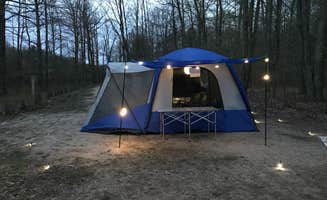Dispersed camping near Lewiston, Michigan provides backcountry experiences in the northern Lower Peninsula, where mixed hardwood forests and inland lakes characterize the landscape. The region contains over 100,000 acres of public lands across multiple state forests with elevation changes between 800-1,300 feet. Winter temperatures regularly drop below freezing from November through March, while summer camping season typically runs May through October with daytime temperatures averaging 70-85°F.
What to do
Backpacking routes: The Huron-Manistee National Forest offers extended hiking opportunities. One visitor reports, "We walked this trail for 5 days and 4 nights. Cell service was spotty, which was the goal. Lots of wildlife and great views. You need to carry everything out that you carry in."
Horse riding trails: Goose Creek Trail Camp provides equestrian-friendly primitive camping near Lewiston. A camper notes, "I camp here with my horse - there are plenty of trails and there is river access with big stairs leading down to the nice footed river - it was my young horses first time being in the water and the stairs made it easier for him."
Wildlife viewing: The forests around Lewiston support diverse wildlife populations. Seasonal elk viewing opportunities exist, especially during fall rutting season when males are most active. Visitors should maintain 100+ yard distance from elk and never approach calves or females with young.
What campers like
Secluded lake access: De Cheau Lake Camping offers water-adjacent primitive sites. The location accommodates multiple vehicles despite feeling removed from civilization, making it suitable for small group camping experiences.
River camping opportunities: Many dispersed sites in the region provide access to waterways. The Manistee River corridor features numerous primitive campsites. According to one camper, "Thw campground itself was very nice...it was our starting point for our family hiking/backpacking/camping trip this year. We had 11 Grandkids with us, and we had 9 backpacking tents."
Varied terrain: The area features significant elevation changes unusual for Lower Michigan. One visitor explains, "This forest area is unique because it offers large changes in elevation that you do not typically get in Michigan, especially not in the lower peninsula. There's the perfect mix along the trail of designated and undesignated-dispersed campsites."
What you should know
Recreation passport requirement: Michigan Recreation Passport is mandatory for many dispersed sites in state forests around Lewiston. This permit costs $12 annually for Michigan residents when purchased with license plate renewal or $17 at entry points.
Limited facilities: Most backcountry camping areas near Lewiston lack basic amenities. The Pigeon River State Forest dispersed camping areas have no potable water, toilets, or trash service. Campers must pack out all waste and bring sufficient water or filtering equipment.
Site selection considerations: When choosing dispersed sites, look for previously used areas with established fire rings. State regulations require camping at least 1 mile from designated campgrounds and 200 feet from water sources. Sites within Pigeon River State Forest should be at least 100 feet from trails and forest roads.
Tips for camping with families
Water activities: Streams and lakes provide natural entertainment for children. At Goose Creek, "there is river access with big stairs leading down to the nice footed river," making water entry safer for inexperienced youngsters.
Trail accessibility: Select routes appropriate for younger hikers. Some family-friendly routes include shorter loop trails under 5 miles with minimal elevation change. One family recounts, "We had 11 Grandkids with us, and we had 9 backpacking tents. The children all carried their own tents, sleeping bags, and food for 4 days."
Wildlife education opportunities: The Cut River Dispersed Campsite area provides chances to observe and learn about forest ecosystems. Bring wildlife identification guides specific to northern Michigan forests to engage children in learning about local species and their habitats.
Tips from RVers
Site access limitations: Most dispersed camping near Lewiston has restricted access for larger vehicles. Forest roads are typically narrow, unpaved, and may have low-hanging branches. Vehicle clearance of 6+ inches recommended for accessing remote areas.
Campsite preparation: When using RVs at primitive sites, bring leveling blocks as most natural sites lack grading. Many dispersed areas require backing into positions with limited turn-around space, so smaller trailers under 20 feet generally navigate forest roads more successfully.
Supply planning: No hookups exist at dispersed sites, requiring self-contained operation. The nearest dump stations are in Gaylord (27 miles west) and Atlanta (15 miles east). RVers should bring sufficient fresh water for their stay, with the closest potable water sources located at developed campgrounds several miles from most dispersed sites.


